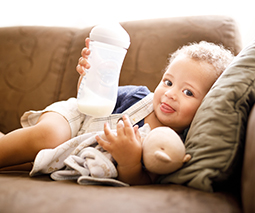Feeling shy: 11 ways you can boost your toddler’s confidence

A healthy level of confidence and self-esteem are important qualities to have, but babies and toddlers don’t start out with bucket-loads of confidence and well-established self-esteem. Rather, these develop gradually and are qualities parents and carers can help nurture.
Self-esteem relates to how a person sees their value in the world, while confidence is more task-specific and relates to tackling a specific action or situation.
As your little person becomes a toddler, there are plenty of ways you can encourage growth in confidence and self-esteem, which will lay the foundation for healthy emotional development. If your toddler is a little on the shy side, here are 11 ways you can boost their confidence:
1. Avoid labels
Experts agree that when it comes to our kids, we should avoid labelling them with words such as “shy” or “nervous”. Labels have a way of sticking and too often can become self-fulfilling prophecies.
If little Sally is called “shy” often enough she’ll take on this label and act accordingly – potentially for the long-term. A better way to use the word shy is to put “feel” in front of it. We all “feel shy” sometimes, but this doesn’t have to be a permanent trait.

2. Validate their feelings
Speaking of feeling shy, it can be helpful to help young children put words to the way they’re feeling and experiencing situations. This can help them understand more about their emotions as well as reassure them that their feelings are accepted by others. For example: “I can see you feel shy when we go somewhere new. I feel shy sometimes too.”
3. Role model confidence and resilience
Our children are learning from us all the time, and if your toddler witnesses you in a moment of feeling unsure or frustration but sees you stick at something until you get a result, they’ll be more likely to try this themselves.
4. Acknowledge their confidence
If you notice your toddler trying something new, praise them for being brave and giving it a go. For example, if your toddler is feeling shy at a party, but decides to try sitting in the Pass-the-Parcel circle anyway, give them props for doing this despite how unsure they were feeling. Also point out how good they feel after giving the scary situation a try.

5. Love is the way
Building a strong emotional attachment began when your toddler was a baby, but his need for love and security doesn’t wane as he gets older. In fact, showing him love, affection and acceptance is going to matter now more than ever as he develops into a more complex person.
Never underestimate the value of a good cuddle or a loving ruffle of his hair, which carry so much significance for a child – namely that he’s a highly worthwhile human being.
6. Prepare them for what’s ahead
Some toddlers are sensitive in new situations, but you can help prepare them for plans by explaining where you’ll be going together and who’ll be there. That way, when your toddler arrives at the scene, they’ll be primed for what to expect, and head into the scene with more confidence.
7. Don’t push (but don’t overprotect)
Be sensitive about how much you encourage your toddler to do something he isn’t quite ready for, as this can often backfire. But also be mindful of how much you step in to do things for him, as this can lead to a lack of inclination to try new things for himself.
8. Encourage problem-solving
Whenever possible, use problems as an opportunity to look at different options, inviting your toddler to help come up with solutions. This will boost his confidence and self-efficacy so that he’ll trust his problem-solving skills more readily down the track.
9. Let your toddler say ‘no’ (sometimes)
Saying no is great for learning the basics of assertive behaviour, and most toddlers will use this word several times a day! Every now and then – and within reason of course – allow your toddler have his way.
Let him say “no” to a request by you, and give him the opportunity to experience the consequences for himself. For example, wearing sandals on a cold day might cause his feet to become chilly, but taking charge of a decision will benefit him in the confidence department.
10. Let your toddler make decisions
Similarly, try letting your toddler be in charge of simple decisions now and then, offering him two choices and allowing him to pick one of them. This gives him a sense of control and helps boost confidence and self-esteem.
11. Take things step-by-step
Big events and new scenarios can be a hard process for a toddler, so try to break these down into smaller steps if possible. For example, trying a new childcare centre could be done in stages, with your toddler spending the first session there with you, followed by a morning there without you, and then gradually building up until he’s feeling confident enough to spend a whole day there.
A little bit of forward planning can set the stage for much more confident kiddos – and much calmer families too.









